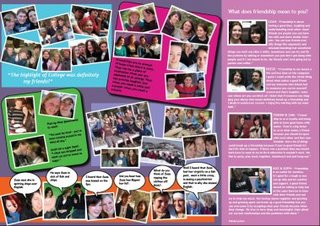Looking for opportunities in topics for the tools for self-understanding
I have just gone through a couple of weeks where students have been debriefing their experience and learning of an authentic task - the making of the college yearbook. Now we are onto to the next task... the launch of the yearbook.
So let's come up with an advertising campaign. What things could we do, what teasers could we use, what slogans for posters? We have a lesson of brainstorming. Then it is the weekend and I sleep on it. I begin to unpack the sort of excitable responses the students have made. I realise that I could now give them a little theory on advertising - look at the ploys used and ask them whether it is ethical. Usually I would do this at the beginning of the year, but producing an on-line magazine hasn't really required this.
I email my students a teaser for the following lesson... what ploys do you think you were using in coming up with advertising strategies (I give them a list to look at) and do you think it is ethical to use them?
Then I sleep on it. I remember their earlier debriefing where they unpacked what they learnt or who they felt they had become as a result of the yearbook project. Self-reflection is limited by the conceptual frameworks we are using. Perhaps my role is to help expand these frameworks... to help students build up their meta-language, to enable them to better unpack their behaviours and barriers. Perhaps I can also help them name some of the barriers they experienced which prevented them from participating in the project more effectively - so many of them have self-esteem issues, deeper fears or inhibitions and are struggling to self-actualize.
Hmmm. I now look again at my approach to advertising. Really, I have just been looking at the surface, but can I link this more deeply to ourselves, our development and our own needs? Can I help students develop a meta-language to explain their own self-science?
I now create a worksheet where I introduce Maslow's Needs Heirarchy and summarize Stage Development. On the back are a list of advertising ploys and I have added "cost benefit selling" - which is about selling how the product meets a person's need rather than selling the features of the product.
So it is time for class. We discuss emotional manipulation and what manipulation techniques (advertising ploys) they use with friends, family or teachers. Yes, using guilt is a preferred modus operandus! We brainstorm all the McDonald ads curently on TV - about 10 different ones - and unpack which of Maslow's needs they are targetting - and it becomes evident McDonalds are targetting every need!!! Students are a little astonished.
Later in the class, one girl wants people to go do something for her, she uses sighs, "you don't really care for me... if you did you would do this for me..." It is her standard way of manipulating people in the class. But no one is buying this time. I say cheerily, "Are you trying to use guilt, to make me do this? Now, is that ethical?" She looks at me a little taken aback.
So perhaps it starts... we have a language now to start naming behaviours and start discussing where we might be stuck. But I have only three more lessons to go until the end of the year. A bit too late really. Who might follow this up with these students?
It occurs to me that there is now room to make this more explicit in our development of the new curriculum framework of four learning elements. Perhaps in the learning element which relates to student development/personal pathways/wellbeing we should be asking what meta-languages might help students examine self, their self-development and their behaviours? There are a number of models. If we teachers could knowingly (and perhaps consistently) draw on them, and look for how they might tie in with particular topics or activities then we can build this into our courses, rather than seeing it as something separate.
For all my students, this was their first time that they were exposed to the Maslow's needs heirarchy or a theory of stage development... or even challenged to name behaviours. Don't we really care about emotional intelligence? If we did, we would be strategically incorporating its development into our teaching goals. (and am I now the one playing the guilt card?)






